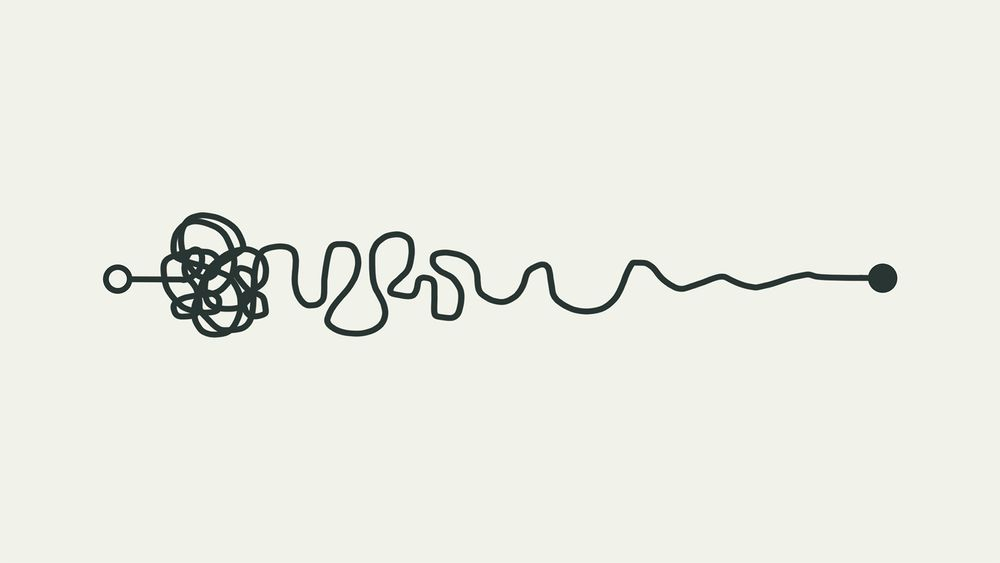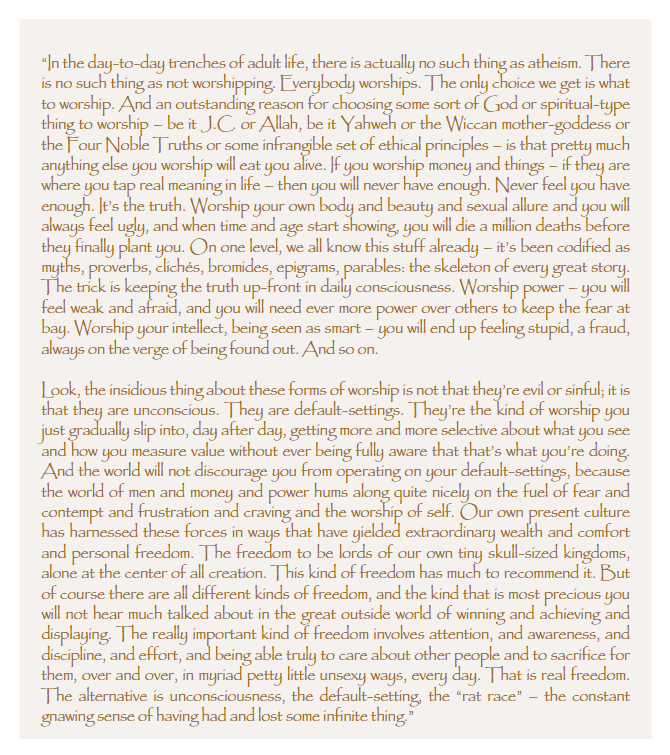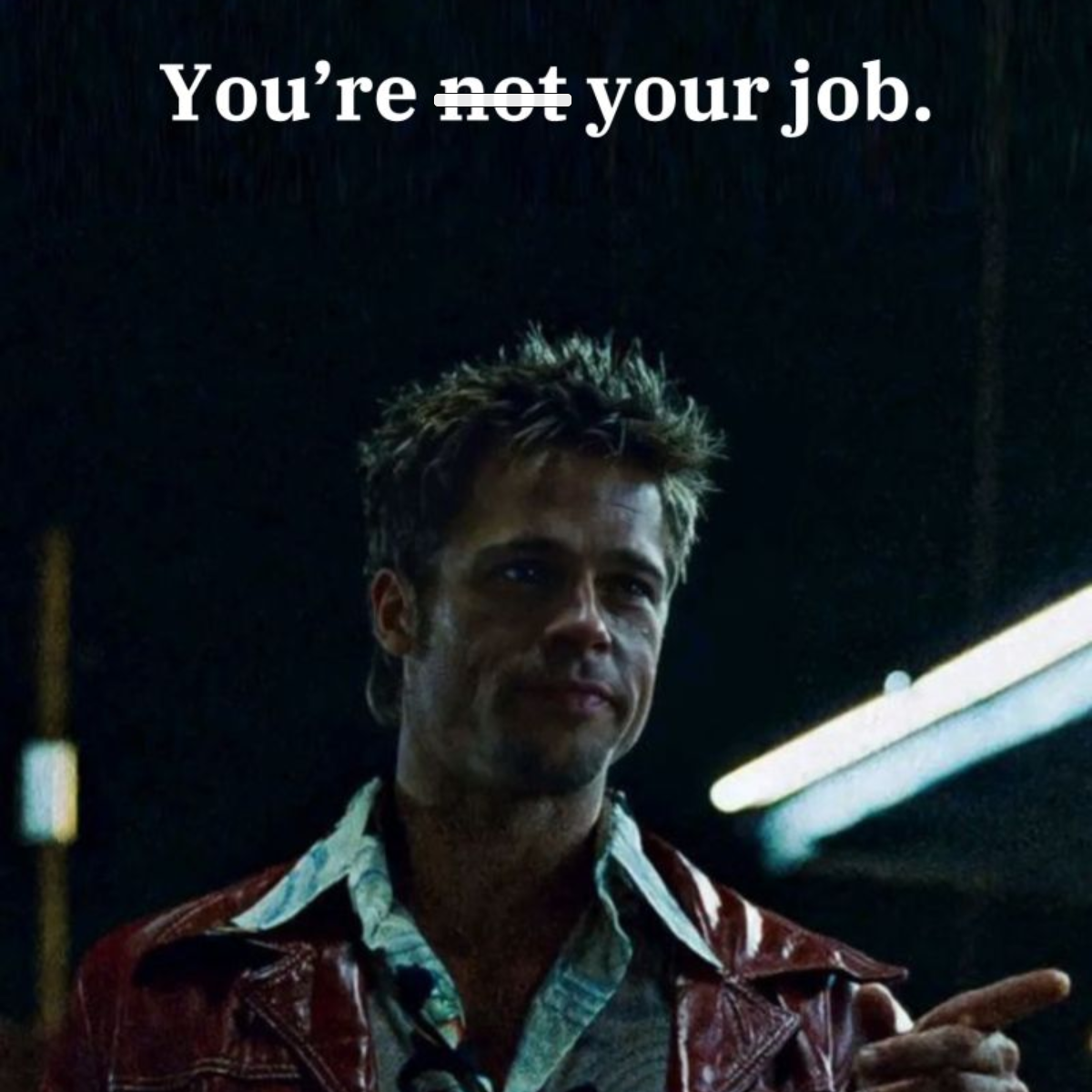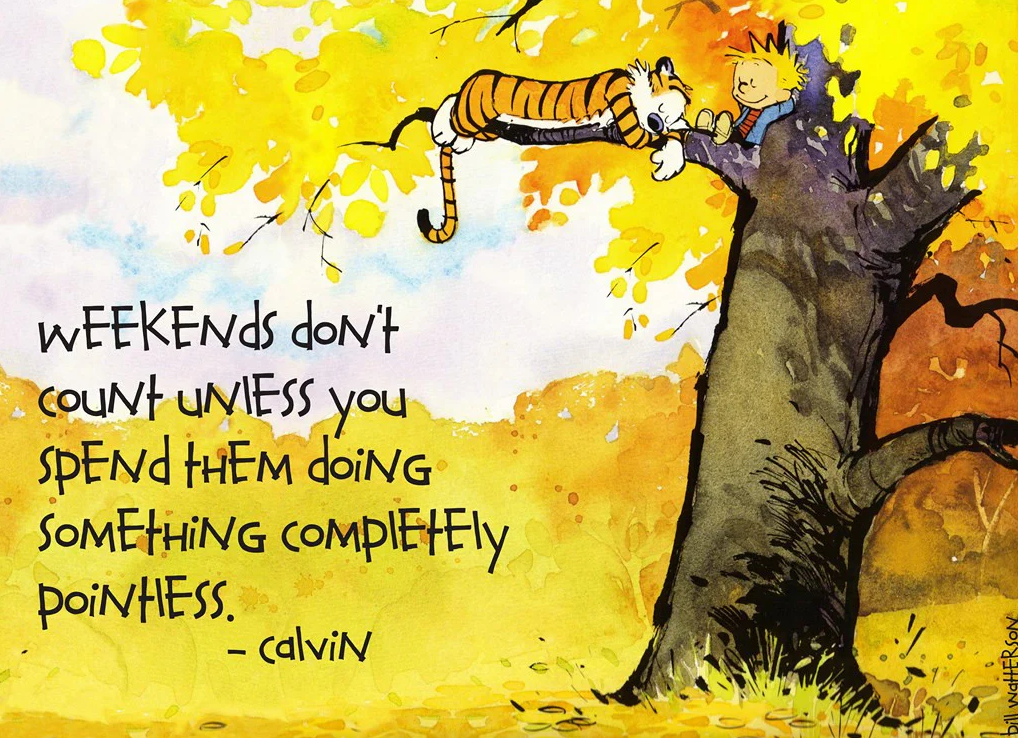You Are Not A Lottery Ticket
This post is about Habits and how they relate to Identity, Agency and Luck. It is a reflection on an essay by David Foster Wallace that I recently encountered. In it, he captures the day-to-day aspects of the human experience in a way that’s both insightful and concise. His insight about our subconscious “default-settings” resonated with various perspectives that I’ve encountered about living more consciously, and I felt compelled to synthesize them here. I believe this synthesis can be particularly useful during times like “the squiggle“—the messy, nonlinear journey during transitions when one is figuring things out and deciding between different choices with limited feedback. After incorporating different perspectives, I attempt to make these ideas about daily routines relevant and actionable for first-time founders. Although written with them in mind, the main takeaways are broadly applicable to anyone navigating a period of uncertainty.

I begin by quoting Wallace, whose observations I reference throughout the post. Next, I explore how habits and routines subtly shape who we are, drawing on both Eastern and Western perspectives. Once we have an awareness of how habits create a ‘passive’ self, we examine the source of our agency to cultivate an ‘active’ self. I then explore how to ‘actively’ deal with ego and subconscious identities that get in the way of developing one’s agency. Finally, I tie these insights to the challenges first-time founders face in navigating the uncertainties of early startup life.
[This post is a bit longer than usual to thoroughly unpack the nuances of the topic. By connecting these different ideas and exploring where they converge, I hope to not only deepen my own understanding of intentional living but also offer a source of reflection for others. If you’re interested in only the tactical insights, feel free to skip to the 4th section, and for the key takeaways, refer to the 5th section.]
1. On Recognizing “Water”
In 2005 author David Foster Wallace delivered the commencement address at Kenyon College. You can read the entire commencement address here—“This is Water“. The essay is actually a meditation on the fact that the important realities are often the ones that are the hardest to see and talk about. I encourage you to read it all, but the two paragraphs near the end neatly convey his message:

In the above, Wallace argues that true freedom (the kind that leads to fulfillment and real happiness) comes when we choose to live mindfully and purposefully in service of others, rather than being solely driven by external freedoms and self-centered desires. One may argue there isn’t much new to learn here. Finding meaning in service shows up in lot of other places such as Adlerian Psychology, Religion, Groundhog Day etc. But, some writers just have a way of capturing their lived experiences in concise words and make it just so much more powerful! Wallace’s observation— that we are creatures of habit—may seem mundane, yet it has profound implications for our understanding of the self. To quote Moxie Marlinspike, “Tyler Durden was wrong, you are your job! And, you need to be careful what job you take, because your job (and its environment) will change you.”

2. On Recognizing The Role Of Habits In Creating A ‘Passive’ Self
If we accept that much of human behavior is governed by ingrained patterns, it can leave us questioning the very nature of who we are. In his book The Path, Professor Michael Puett draws from Chinese philosophy to challenge our notion of a “rational true self.” Like Schopenhauer, he suggests that we are a “messy bunch” of energies, emotions, desires, and dispositions. This complex inner makeup drives our actions and solidifies into patterns over time, shaping our identities for years, even lifetimes. In a sense, these patterns become us, and they can even be passed down through generations—not through genes but through repeated behavior in familial environments (samskaras).
Further, Puett offers a refreshing perspective on the role of rituals. Rather than enforcing conformity or a specific way of being, he says rituals serve to disrupt our habitual patterns, allowing us to step out of our ruts. He argues that these patterns, while deeply rooted, are not fixed; they are, in fact, alterable. Small shifts—introduced through customs, conventions, or simple daily rituals—can break the hold of these patterns, nudging us toward new ways of being. Practically, Puett suggests that by making small, consistent changes in our daily lives, we can gradually reshape our sense of self. These incremental shifts, though subtle, can have a profound impact over time.
In Puett’s own words: “We like to think, Yes, we are liberated people because we can decide for ourselves how to live our lives, as opposed to those traditional people who couldn’t. The intriguing thing is, maybe in part, it’s sort of the opposite. That, in our grand visions on how to live liberated lives, by being true and sincere to ourselves, we ironically create a ‘stable’ self (that’s patterned and rutted) and assume a very stable world around us. Whereas a lot of these other ideas that have risen in world history were all about recognizing the degree to which the world isn’t really stable… And if you think about it seriously, you’ll realize the world is really incredibly malleable and we are, in part, creating that world, often poorly, often passively. But, if you change that, and begin living your life (actively) the way they (ancient Chinese) are describing it, suddenly you’ll realize this world can be created by the little tiny things that we are doing all the time.”
Thus, in Puett’s view, the truly liberated individual isn’t one who is passively “true” to a fixed self or a stable world but one who actively engages with the world’s inherent unpredictability. Liberation, in this sense, means continually reshaping oneself and one’s surroundings through conscious, small acts, rather than assuming a fixed identity or reality.
Prof. Puett’s suggestion to examine traditions closely before dismissing them reminded me of an interview with Peter Thiel, where he argues that “faith and reason are compatible and that when you remove faith, you risk losing reason as well.” Thiel’s position stems from a similar understanding of human nature, which suggests that we aren’t inherently “rational” but rather a “messy bunch” of emotions. In our inevitable quest for meaning, we are easily swayed by what others covet or desire due to our mimetic, ape-like behavior. Although I understood this perspective through the lens of mimetic theory, I initially struggled to see why it would require transcendental religious beliefs (if interested, you can watch the referenced ~3 min conversation below).
However, after reading Puett’s exploration of how habits can passively form rigid identities—along with Wallace’s insight that our only true choice is what we worship—I now appreciate that such beliefs help build consistency in following the “right” role model without overthinking each step. This is so because knowledge alone is not enough to prevent humans from ape-like behavior when it comes to search for meaning—that requires constant reminder and practice. Therefore, such beliefs—by design—lead one to habits that keep the “right” role model front-and-center in daily life and thereby help them focus on their goals by avoiding the “madness of crowds.” Perhaps this explains why someone like Benjamin Franklin, despite not adhering to organized religion, chose to include Jesus (as well as Socrates) among his role models. Franklin used them as touchstones to cultivate the virtue of humility, one of the thirteen virtues he used to shape his character. In summary, one could argue that although transcendental beliefs are not strictly required, they are very effective at countering the mimetic tendencies of humans.
3. On Recognizing The Source Of Agency To Cultivate An ‘Active’ Self
Once we recognize the impact of our default habits, we open the door to greater agency—the power to choose and act beyond ingrained patterns. This newfound awareness empowers us to proactively shape our external reality, rather than passively waiting for circumstances to change. However, creating meaningful change requires “The Will”—the inner resolve to sustain deliberate actions over time. To harness this willpower over long periods of time, we must first cultivate a genuine and deep-seated belief in our capacity to grow and transform.
But having a deep-seated belief is just a necessary condition and not a sufficient condition. We also need to have an alignment with our values and actions. When our beliefs align with our values and actions, it reinforces “The Will” and give us the strength needed to overcome challenges over the long term. Conversely, when our beliefs don’t align with our values and actions, it erodes “The Will,” manifesting as self-doubt or loss of agency in the external world. To correct this, we must identify the default-settings in our minds that no longer serve us—such as fear, self-doubt, or limiting beliefs—and actively work to shift them. Only once we resolve, accept or make peace with the internal conflicts, do we get back our self-respect, strength and courage to take actions that change the outer world. As the saying goes, “The outside battles become much easier to face once the inner battles are won.”
In You’re Not a Lottery Ticket, Thiel posits that indeterminate optimism is the dominant religion of our times: the assumption that things will somehow work out, even without concrete plans or accountability. He posits that most people are governed by default patterns that are shaped by group think, rarely challenging societal assumptions or thinking critically about their choices. As a result, they end up indulging in “lemming-like” behavior, following the crowd without truly understanding why. In contrast, founders who resist this mindset—those who think deliberately for themselves and act on their thinking—are more likely to create an “alpha” (as compared to the rest). By building towards what they foresee, truly successful founders “actively” shape the world and create value by design rather than by chance.
Thiel advocates for founders to exercise their agency and cultivate a clear, determinate vision for the future. In his words, “In a determinate world, one of the most important metrics is the robustness of the secret plan - a definite view of the future that is not static but that’s a radically better future that can motivate and coordinate and inspire a large number of people to change the world.” The key quality here is “robustness”—a bold and distinct vision that has the strength to inspire and drive action. But how can founders ensure their plan is robust and not heading toward a “wrong” vision, especially in the chaotic early stages? How can we work backwards from our desired outcomes while still being nimble to adjust to changing environments? This leads us to examine the role of ego, which can hinder a founder’s agency by preventing rightful actions and unbiased reasoning. It is the ego that keeps us tied to our old identities and looks to peers for validation of our beliefs, making it harder to course-correct and adjust to external realities when necessary.
4. On Recognizing Ego & Subconscious Identities That Get In The Way
A lot of times founders create products that solve a personal pain point and that’s what gives them the conviction and deep understanding about the problem. But the longer one works on a problem, the easier it gets to conflate solving a personal problem with ‘falling in love with one’s own solution’ in which case one has started to associate one’s identity with the idea they have been working on for so long. And then that creates all sorts of biases. So, what to do? Are there any leading indicators to know if one is on the right track? I think there’s no other way apart from getting external feedback - i.e., talking to potential target customers to validate if the personal pain point is, in fact, real. Periodically reflecting on Wallace’s insight—“Who are you worshipping? What are your defaults?” is also useful because prioritizing anything apart from what the customer genuinely needs leads the founders astray. As banal as this sounds, it’s easy to let this slip by. Just as not having an explicit strategy usually means there are multiple implicit strategies with potentially conflicting priorities, not having an explicit target customer usually means there are multiple target customers with potentially conflicting priorities.
Founders can also create mechanisms to avoid over-identifying with their own solutions. If one’s identity becomes tied to an idea, the ego starts distorting the reality. This attachment to a single perspective stifles new perspectives. Practicing mindfulness is one of the most effective ways to counteract this natural tendency. To make it more concrete - by observing thoughts and emotions without attachment, founders can start to recognize the beliefs and narratives that have subconsciously solidified as part of their identity and now drive their actions to their own detriment. Once recognized, labeling these beliefs helps weaken their grip on the ego and allow one the choice to not act based on an old identity. Just as sunlight acts as a disinfectant, awareness and labeling diminish the power of these narratives, making it easier to act independently of them. With such consistent, mindful actions, one can gradually shift their identity. And only after the identity has shifted can one start shaping the world around them in congruence with their new sense of self.
Practicing mindfulness, however, takes time and practice. First-time founders are often burning the midnight oil in the early stages and there’s usually no time for fluffy stuff. They have to deal with a lot of uncertainty and ups and downs. Designing external mechanisms can therefore complement mindfulness in generating the desired outcomes— both for creating desired habits and for breaking old habits. Borrowing from what Prof. Puett talks about, these mechanisms can take the form of personal rituals and team rituals that force founders to form new patterns (e.g. empty chair meetings, PR-FAQs) or temporarily break out of their old patterns (e.g., offsites, change of location, periodically deleting all the regular meetings, conducting premortems, etc.) At a higher level, the impact of these rituals is essentially a shift in perspective, helping founders view challenges from different angles—whether by physically stepping away from the routine or through roleplaying to enhance perspective-taking.

5. On Recognizing The Middle Way To Improve The Quality Of Actions
To conclude with Wallace’s insight again: True freedom (and probably outsized success) for founders comes when they live mindfully and purposefully, in service of their customers rather than driven by self-centered desires. If we look closely, there are three broad takeaways from this conclusion:
- Taking Action - One must trust the Force but take responsibility for their actions. The key is to act, but stay detached from outcomes. That happens when one lets go of the illusion of control and focuses their attention on the only thing under one’s control i.e. the nature or ‘quality’ of their actions.
- Mindful Action - One must be intentional about their actions and not just passively interact with the world. Improving the ‘quality’ of one’s actions helps get to the desired result faster. And, the actions that have good ‘quality’ feel somewhat effortless. For example, when one is operating in their Zone of Genius, one naturally shines as they are playing to their strengths and assume a play-like attitude towards their actions.
- Purposeful Action, In Service of Others: - One must find a larger goal that helps transcend one’s selfish desires. Instead of focusing on what the world can offer you, consider what you can contribute to the world. While it’s natural in a capitalistic society to prioritize self-preservation and personal success, excessive self-interest and greed can be counterproductive once your basic needs are met. Designing your business to serve the greater good—beyond just personal profit—helps curb this excess and can lead to meaningful, sustainable success. In this sense, aiming to build a “monopoly” for the greater good seems like a goal that is not only ‘noble’ but also has a higher chance of outsized success over the long term.
If these ideas seem somewhat contradictory, that’s because they are—but that’s a feature, not a bug. Clinging to fixed beliefs or absolute truths can cloud our understanding. For example, if criticism of XYZ triggers discomfort, it might indicate a strong identification with XYZ. True reality is rarely found at the extremes; instead, it lies in “The Middle Way”. In practice, this means embracing mindfulness and avoiding strong identification with any ideology (whether economic, political, religious, etc.). Genuine mindfulness emerges when we let go of our fixation on the self. So, the next time when you find yourself navigating a squiggle, act—mindfully and purposefully! Build routines and seek environments that help you perform quality actions. It will not only foster resilience in the face of setbacks but also get you to the ‘right’ place faster. As Seneca puts it and Hamming, Andreessen, etc. reiterate— Luck is what happens when preparation meets opportunity. So, trust your intuition, let go of the illusion of control, and prepare—focus on the quality of your routines and actions. With mindful effort and purposeful intent in service of others, you’ll align yourself with both opportunity and purpose. May the Force be with you!